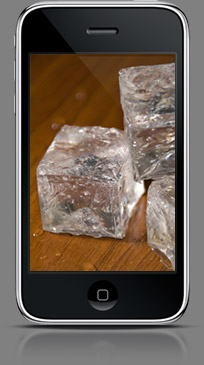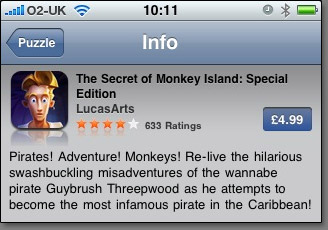The App Store needs to implement a 1-hour cooling off period
[caption id="attachment_2486" align="alignright" width="204" caption="Cooling off after a purchase makes for happier users and devs. Photo by Kyle May."] [/caption]
[/caption]
Yesterday morning, I woke up and – as I do every morning – reached for my iPhone to turn off my alarm. Still in bed (and still on my iPhone), I skimmed Twitter, Facebook, and my email where I found a message that made me want to check something on my notebook. It being the grey, rainy, and horrible day that it was, I didn't want to get up and go downstairs just yet.
"Ah! Wait a second… I don't have to!", I thought.
A while back I had purchased Jaadu VNC for remote controlling my laptop from anywhere. Although it cost me about £15, it was a great app and did exactly what it said on the tin. I just needed to download it again from the App Store and I could laze in bed for as long as I wanted to.
So off I tapped to the App Store, searched for Jaadu, saw the icon and tapped the Buy Now button to download it again.
Mission accomplished? Not quite. Quite the contrary, actually.
[caption id="attachment_2460_aral1" align="alignright" width="328" caption="The problem, dear Brutus, is that I've already bought this app… or did I?"] [/caption]
[/caption]
This brings me to my first issue with the App Store and it is one of basic usability:
Downloading previously-purchased apps is a game of Russian Roulette
There are two usability issues with downloading previously-pruchased apps on the App Store. The first is the following:
- You can't see whether or not you've already purchased the app you're viewing in the store, and
- To download the app, you have to tell the App Store that you want to buy it. Only after you've asked to purchase it does the phone inform you that you've already bought it and can download it again.
So what happens if you mistakenly tap the Buy Now button on an app that you thought you had bought, but which you actually hadn't? You will, of course, end up buying the app for the first time.
But surely that would never happen, right?
I mean, who doesn't remember which app they've bought?
That's right, yours truly!
[caption id="attachment_2464" align="alignright" width="328" caption="Same icon, different app."]![]() [/caption]
[/caption]
Little did I realize, in my freshly-woken state, that I had tapped the Buy Now button on Jaadu Remote Desktop For Windows (i.e., on Jaadu RDP not Jaadu VNC). It gets worse: both apps share the exact same icon and sell for exactly the same price of £14.99. This brings me to my second usability issue:
App icons must be unique.
App icons are the primary visual means by which we identify applications on the iPhone. Apple should not allow two applications to share the same app icon and should, furthermore, keep an eye out for icons that aim to confuse users by appearing too similar to other – potentially more popular – apps.
But what if you did end up purchasing an app by mistake? Surely, there's some avenue for recourse, right? Well, according to the iTunes Store policies, no: All Sales Are Final.
With the iTunes Store, all sales are final. As soon as you click the Buy button (using either 1-Click or the Shopping Cart) your purchases are charged to the credit card on your Apple Account. You cannot cancel a purchase or receive a refund for a purchase.
So, basically, you can try and contact support (like I did, I'm waiting to hear back from them) but unless Apple decide to special case your support request and give you a refund, you're screwed.
Now, as a developer who is anxiously looking forward to having his first app on the App Store before Christmas, I don't like this. It isn't good for users or for developers.
No refunds means that users suffer
Apple's no refunds policy for the App Store, coupled with the usability problems I outlined above, can lead users to make erroneous purchases. This means that users end up getting the short end of the stick.
And what if a user didn't make a purchase by mistake? What if they bought your app, tried it out, and within the first few minutes realized either that they hated it, or that it didn't do what they thought it would or <enter your reason here>? What options do they have? None.
Oh wait, did I say none? I meant they have just one option: to leave a tersely-worded 1-star review for your app on the App Store.
No refunds means that developers suffer
If, for whatever reason, users cannot get a refund for an app that they are unhappy with, they are going to be feeling cheated. Out of anger and frustration they are going to do the only thing they can to get back at the developer for making them feel this way: leave a 1-star review for their app. These 1-star reviews skew the app's ratings down and hurt developers by resulting in lost sales in the future.
But what if users had another option?
After I tweeted about the mistake I made in purchasing Jaadu RPD, Bruno Figueiredo wrote a reply that gave me pause for thought and eventually resulted in me writing this blog post:
@aral that wouldn't be a problem of you were able to undo your purchase within say 7 days.
The App Store needs a cooling off period
Now, I'm not suggesting that the App Store implement a 7-day cooling period. In the face of research that suggests that less that 15% of paid apps are actively used after the first week, suggesting that would be unrealistic. Apple would never agree to something that would so drastically reduce the profitability of the App Store. But how about a much shorter cooling off period that would be just as, if not even more, effective?
How about a 1-hour cooling off period?
A 1-hour cooling off period would benefit users, developers, and Apple.
1-hour cooling off period benefits for users
For users, it would mean that they can easily reverse purchases made in mistake and get refunds for applications that they discover either don't perform as stated or as expected.
It would also allow users to try applications out before having to commit to buying them. That, ironically as it might seem at first thought, brings me to the first of the benefits for developers.
1-hour cooling off period benefits for developers
A 1-hour cooling off period would benefit developers perhaps even more than users.
It would mean that users would not have a basis for leaving 1-star reviews out of anger and frustration. An hour is more than long enough to evaluate whether a mobile application fits your needs. And, as a developer, do you really want to take your user's money if they're not going to use your app for more than an hour or if they bought it by mistake?
Needless to say, a reduction in 1-star reviews will mean that developer's future sales are not negatively impacted.
More than that, it will mean that developers no longer need to invest time and development effort (i.e., money) in maintaining both a full and a "lite" version of their apps. In other words, a 1-hour cooling off period will reduce developer's costs.
But how about Apple? A 1-hour cooling off period would also benefit them.
1-hour cooling off period benefits for Apple
Apple should be looking at its investment in the App Store as a long-term one. Short-term profits are great (and 'a plenty currently) but equally as important is long-term perception and growth. Having the App Store perceived as fair is an important factor in affecting long-term perceptions and future profits. Not having irate customers is good for business: giving them a pressure valve to release their frustrations before they accumulate can only be a good thing in the long run.
Beyond that, having 1-star reviews on apps hurts future sales of those apps. Since Apple gets 30% of those sales, it also hurts Apple's bottom line. And that irate customer may also curtail her app purchases in general, hurting Apple even more.
At the end of the day, 1-star reviews don't benefit anyone: not users (who may get to vent but don't get the actual compensation they were seeking), not developers (who suffer from lost sales), not Apple (who also suffers from lost sales), and not Apple's shareholders (who – although a rather lucky bunch – end up not maximizing their profits.)
To state it plainly: The cure for the 1-star review plague affecting the App Store today is implementing a 1-hour cooling off period.
Finally, as an additional benefit to Apple, a 1-hour cooling off period may have the affect of helping to weed out apps with very little or no value (read: fart apps and their kin) and may help apps with higher and longer-term value to rise to the top of the sales lists, thereby raising the standard of the App Store in the process.
In Summary…
To recap, the App Store currently suffers from several usability issues that make it possible for users to make erroneous purchases. Its current policy of "no refunds" only works to hurt users, developers, and ultimately Apple itself. The solution to all these is for Apple to implement a 1-hour cooling period for app purchases.
I look forward to hearing your comments on this and to hopefully seeing Apple address this issue in the near future.

Comments
by Aral on 2009-11-14 16:27:04
by Aral on 2009-11-14 16:23:36
by Pranab Salian on 2009-12-01 18:02:35
by Srini Centhala on 2009-11-19 00:10:58
by jane on 2009-11-13 20:13:34
by Dave Williamson on 2009-11-16 09:31:48
by Alan the Houser on 2009-12-02 03:31:09
by Aral on 2009-11-18 13:37:21
by David on 2010-08-29 11:39:40